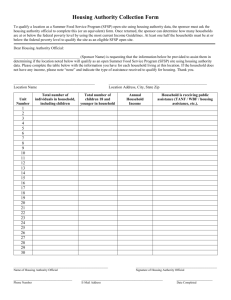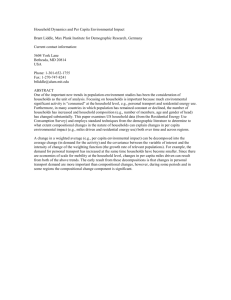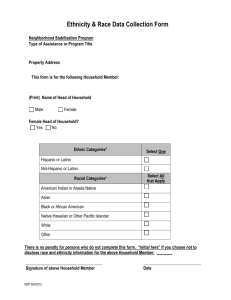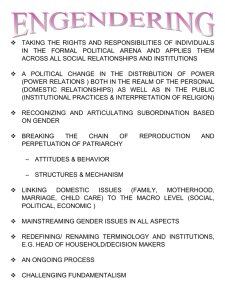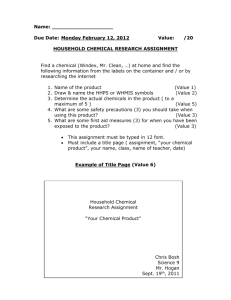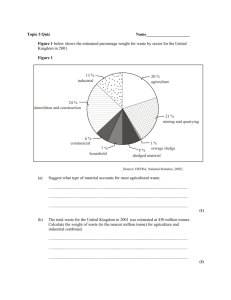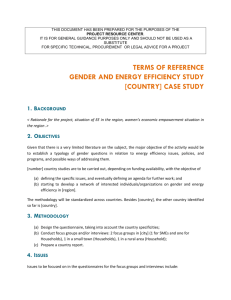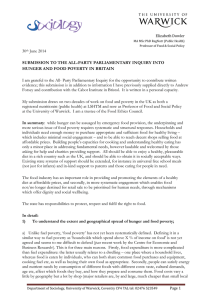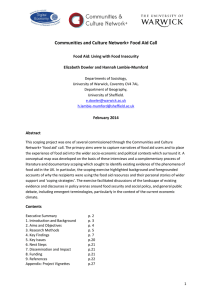The Future of UK Household Security
advertisement
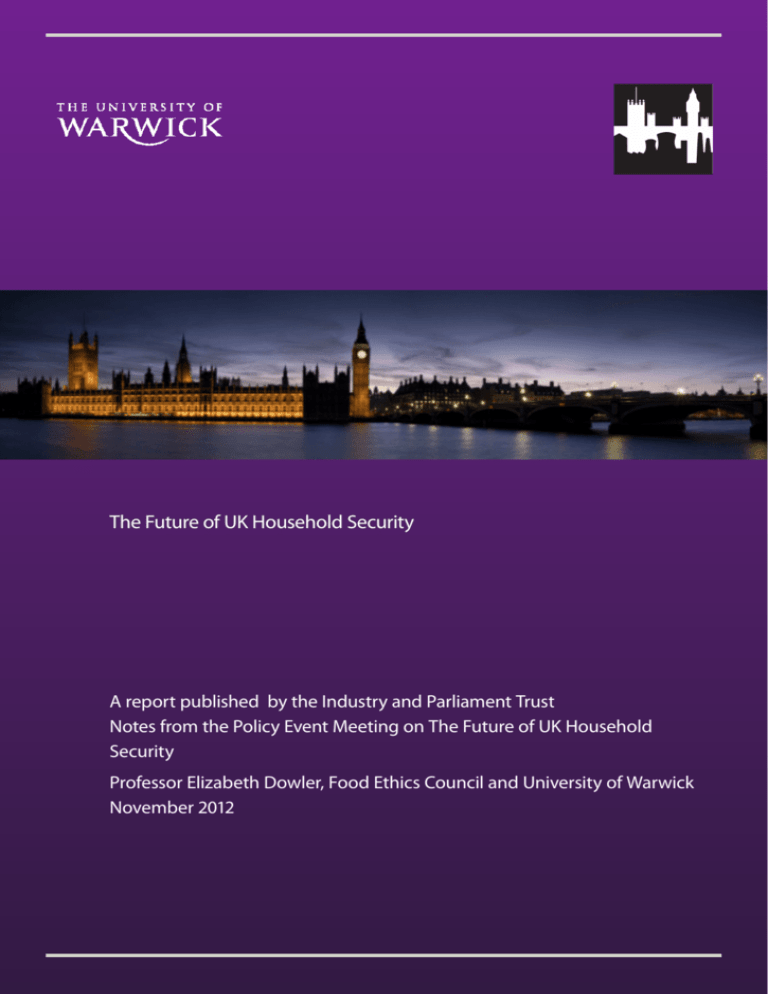
The Future of UK Household Security A report published by the Industry and Parliament Trust Notes from the Policy Event Meeting on The Future of UK Household Security Professor Elizabeth Dowler, Food Ethics Council and University of Warwick November 2012 The Future of UK Household Security INTRODUCTION Household food security in the UK is an increasingly important social and political problem, but one that until recently has failed to attract significant attention, either among policy-makers or academic researchers. In this briefing paper, Professor Elizabeth Dowler explains how and why more and more families in the UK are unable to buy affordable, nutritious food, and discusses the role of government and industry in finding solutions to this problem. 03 04 www.ipt.org.uk/ THE ISSUE: WHAT IS FOOD SECURITY? Household food security means that ‘all people, at all times, have physical, social and economic access to sufficient, safe and nutritious food to meet their dietary needs and food preferences for an active and healthy life, and the confidence that access can be assured in the immediate and long-term future’. The goal of food security is that people should not be required to make trade-offs between immediate poor nutritional status and long-term livelihood sustainability, and that they should have access to the food that they want and need. Food security in the ‘global south’ rightly receives significant political attention, but the growing number of people in ‘global north’ countries such as the UK who are unable to meet their household food needs have been largely overlooked. This is despite clear evidence that a crisis is emerging: one mark is that in 2011-12 charitable food banks fed 128,687 people nationwide, 100% more than the previous year (Trussell Trust), and in the same year, food redistributed by FareShare contributed towards more than 8.6 million meals. Moreover, food banks are now being used by an increasingly diverse range of people, including those who find themselves now on a low income due to rapid loss of earnings, changes in receipt of state benefits or changes in household structure (such as separation or arrival of dependents). Multiple factors have contributed to this situation. 13 million people live below the relative poverty line in the UK, after housing costs are taken into account (DWP, 2012) and poverty is strongly linked to inadequate nutrition and ill health. Research has shown that those in receipt of means tested benefits, unemployed, or in lone parent households (all more likely to be low income) had worse micronutrient intake and dietary patterns than those not in these circumstances, and are also more likely to be overweight or obese (Dowler and O’Connor 2012). However, now the rising costs of food and fuel are putting much more pressure on household budgets, and these upward price trends are unlikely to be reversed in the longer term. Thus longstanding inequality in household incomes and opportunity is being compounded by cuts to welfare and regressive taxation (particularly the increase in VAT); many who are poor are also in waged work. Newly upgraded Minimum Income Standards set a potential benchmark for assessing welfare and wage sufficiency – both of these fall well below what is needed to eat healthily and appropriately. The Future of UK Household Security WHY DOES IT MATTER? The roles and responsibilities for ensuring household food security are becoming less clear. There is increasing dependence by both families and governments on charitable food distribution systems and civil society organisations, yet the extent of problems faced by households of different circumstances in feeding themselves adequately and appropriately, and the nature of responses by different actors, is hidden from public view and not discussed. It also matters because poor nutrition and food patterns contribute to inequalities in health, and to general misery. Policy responses at present seem to fall into three categories: • Promoting waged work as a way out of poverty, however unreliable, poorly paid or inappropriate, but not to develop sustainable livelihood possibilities • Challenging the legitimacy of claims for social welfare benefits, and demonising those who cannot ‘manage’ on incomes demonstrably too low to meet needs • Leaving the practicalities of meeting people’s pressing needs for food to individual philanthropy and, increasingly, an institutionalised private charity sector Defra has responsibility for food security and their approach recognises that everyone should be able to access and afford a healthy diet; however, Defra has no mechanisms to achieve these conditions. Food policy is underpinned by a rational consumer choice model, although this also assumes households will be able to regard food as a high priority basic need. Indicators of access include monitoring food prices which is obviously important, but fluctuations in competing expenditure demands (such as rent or fuel costs) are not part of systematic food access monitoring. The assumption seems to be, crudely put, that people will buy appropriate food for health at the cheapest price available if they have sufficient knowledge and skill, and so policy tends to be focused on these latter, ignoring both conflicting pressures and the desire to purchase food acceptable to all household members that meets cultural needs, which is as important for low income households as others. The UK food security agenda does not comment on the protection of livelihoods – access to work that pays sufficient to obtain healthy food, or to sufficient welfare support for those unable to work – both of which are increasingly seen in international development initiatives to combat poverty, food insecurity and prevent destitution. 05 06 www.ipt.org.uk/ The evidence that the statutory National Minimum Wage is too low to enable people to eat reasonably and healthily, especially since its uprating does not keep pace with real costs, is ignored. Also missing is the social agency which comes with employment and community security – which arguably gives people the confidence to make choices and purchases which chime with social and expert guidelines for health and wellbeing. Critically, the sustainability and appropriateness of current responses – food from charitable sources –in the longer term is not discussed. Food banks and other distribution mechanisms are generally not resourced; they are largely staffed by willing volunteers but obtain food either from the food industry and retailers, or from supportive neighbours/church members. Efficiencies in the retail system are reducing waste and therefore, potentially, donations to initiatives such as Fareshare, despite their creativity in generating support. Charities like the Trussell Trust, which rely on neighbour-neighbour provision, while offering opportunity for local philanthropy/support, are enshrining a dependency culture which elsewhere has led to stigma or avoidance. They are also being drawn into difficult financial and social relations with local authorities, who will shortly be required to administer the Social Fund (a Government scheme helping people with expenses that are difficult to meet on a low income). There is a risk that food banks, which are essentially ‘stop gap’ measures, become inadequate permanent solutions with tacit government support because no other policy response is forthcoming. Charitable hand-outs cannot provide enough food for all those who need it, on a long-term basis. Charitable systems do not meet people’s rights to access to healthy, affordable food, and the security of knowing this access is sustainable (which is the definition of food security). WHAT CAN BE DONE? A simple system should rapidly be set up to enable local authorities to monitor the types of households facing food security problems, and why. These data can be amalgamated at national level to give a regular, systematic understanding of what is happening and main causes in different places and circumstances. Support should be given to the use of Living Wage standards rather than the National Minimum Wage wherever possible. Systematic use of Minimum Income Standards to evaluate state benefits is essential. Anything which reduces the current levels of benefits or the National Minimum Wage should be resisted. The current ground-swell of social movements on food at local levels, some of which has had Big Lottery funding, should be supported. Many such initiatives work with people on lowincomes, but they cannot be expected to absorb the problems and increasing current demand for help with basic needs. Such initiatives can contribute to tooling up local communities towards development of food resilience strategies; they should draw on ideas from volunteers and members or clients of food activities. The Future of UK Household Security 07 There needs to be a mechanism for learning from, and developing further ‘hybrid’ initiatives between civil society and the other sectors; people working on the ground can network actively and creatively with people working in policy analysis and advocacy. FURTHER READING 1. Trussell Trust http://www.trusselltrust.org/ The Trust’s fast-growing UK foodbank network feeds tens of thousands of people in crisis in the UK and its Community Enterprises provide vital funds as well as volunteering opportunities for people of all backgrounds and abilities. 2. J Poppendieck (1999) “Sweet Charity? Emergency Food and the End of Entitlement” Penguin. This seminal study of foodbanks in the USA demonstrates the social strains created by neighbourly charity and highlights some of the long term negative consequences of relying on aid to alleviate food poverty. 3. Dowler, E. A. (2008) ‘Policy initiatives to address low income households’ nutritional needs in the UK’ in Proceedings of the Nutrition Society, 67(3), 289–300. This paper evaluates UK policy responses to food poverty and illustrates the importance of understanding that ‘low income’ households have different needs, preferences, and challenges. 4. Dowler, E. (2010). Income needed to achieve a minimum standard of living. British Medical Journal, 341, 4070. 5. Dowler E and O’Connor, D (2012) ‘Rights based approaches to addressing food poverty and food insecurity in Ireland and UK’ Social Science and Medicine 74.1 pp44-51 6. Macmillan, T and Dowler, E (2012) ‘Secure and sustainable? Examining the rhetoric and potential realities of UK food security’ Journal of Agricultural and Environmental Ethics 25, 2, 181-204. 7. Defra. (2009a). UK food security assessment: Our approach. London: Defra. http://www.defra.gov.uk/foodfarm/ food/pdf/food-assess-approach-0908.pdf. 8. Defra. (2009b). UK food security assessment: Detailed analysis. London: Defra. http://www.defra.gov.uk/foodfarm/ food/pdf/food-assess-analysis-0908.pdf. 9. DWP (2012) Households Below Average Income. London: DWP http://research.dwp.gov.uk/asd/hbai/hbai2011/ index.php?page=chapters Elizabeth Dowler is a Registered Public Health Nutritionist and Professor of Food and Social Policy at the University of Warwick. She is also a member/trustee of the Food Ethics Council, an independent research and advocacy group working to make the food system fairer and healthier. She sits on a new Social Science panel for DECC/Defra. Liz can be contacted at Elizabeth.Dowler@Warwick.ac.uk Industry and Parliament Trust Suite 101, 3 Whitehall Court London SW1A 2EL t +44 (0)20 7839 9400 f +44 (0)20 7839 9401 w www.ipt.org.uk Registered as a charity no. 287527 A company limited by guarantee, registered in England no. 1308583

